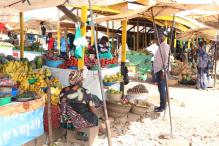Both conflict and organised crime are deeply entrenched in Nigeria. In 2015, the Global Terrorism Index listed Boko Haram as the deadliest terrorist group, with Fulani militants in Nigeria’s Middle Belt responsible for the 4th most fatalities globally. Although there has been a reduction in fatalities in 2016, new militant groups emerged in the Niger Delta region, making Nigeria home to three active conflicts.
Conflict in all three regions is connected to economic and political grievances, as the state apparatus is weak beyond Nigeria’s major cities. This suggests that armed groups may have strategic ambitions, particularly as Boko Haram has openly called for a caliphate separate from the Nigerian state. Increasing literature on the strategic nature of criminal organisations and warring parties highlights a variety of criminal and political motives that evolve over time, adapting to changing situations in order to maximise opportunities. While armed groups in all three regions may engage in criminality to sustain their activities, there is no evidence that they are filling governance roles or supporting civilians in their regions, even in the case of Boko Haram.
In parallel, the World Bank identified conflict and fragility as creating conducive conditions for organised crime. While in some countries, such as Afghanistan and Colombia, illicit and criminal economies are closely linked to insurgency and conflict, this is not the case for Nigeria. Despite several conflict-affected regions and a high concentration of organised crime groups, for the most part crime and conflict remain separate. The prevalence of corrupt officials and the entrenchment of organised crime means that conflict is not required as a cover to move illicit goods. The banking and transport infrastructure of major cities is more important and useful, whereas the three conflicts underway in Nigeria are in rural areas. But criminal activity continues to influence local conflict dynamics in all three regions.
Despite claims of a linkage by Boko Haram’s leadership, organised crime entities have little to do with the group aside from supplying illicit goods. But Boko Haram has created a profitable protection economy in northeastern Nigeria that is exploited by many other groups and individuals. A classic mafia activity, the protection economy established by Boko Haram is extractive in nature, and while those being extorted receive something in exchange – business loans, passage for taxed commodities, or refrain from attacks in certain areas – this does not extend to even primitive state functions. Boko Haram’s link with crime is opportunistic and differs across the northeast depending on what is available.
In the Niger Delta, organised crime activities are largely driven by politicians who use militant groups to assist and provide plausible deniability. Revenue from oil has long supported politicians in the region, but this has become more difficult since President Buhari has prioritised tackling corruption in the oil sector. In response, politicians need to develop more sophisticated methods of disguising their involvement.
In both the northeast of Nigeria and the Niger Delta, armed groups are taking advantage of governance vacuums to engage in criminality and launch attacks with little resistance from the state. State security actors have been complicit in some instances, being paid by armed groups to facilitate criminal activity, or using the conflict as cover to pursue their own criminal activities.
At their core, these conflicts arise from the lack of state presence and the breakdown of the social contract, which provides a vacuum for groups to operate in. However, none of the armed groups currently active are seeking to fill the governance vacuum by providing services or state functions. Rather all groups are maximising the opportunities for profit. Yet, the criminal activities are fuelling local conflict dynamics, providing resources to purchase weapons and maintain cadres of footsoldiers.
In the long-term, the response to conflict and associated criminality in Nigeria will rely on rebuilding the social contract and trust between civilians and leaders at all levels. Strengthening the presence of the state in all regions and ensuring an equitable division of resources amongst the diverse ethnic and religious groups will also be essential. In the short-term though, an increased presence of observers – international, but also internationally supported journalists and civil society representatives – can record criminality and the relationships between militants, criminals and state actors, and make it public. For the oil sector in particular, the private sector can also play a key role in protecting oil pipelines from theft. But this is expensive, and not sustainable in the long-term unless the underlying grievances fuelling oil theft are addressed.
This material has been funded by UK aid from the UK government; however the views expressed do not necessarily reflect the UK government’s official policy.
Dr Sasha Jesperson is the Director of the Centre for the Study of Modern Slavery at St. Mary's University. This post is a summary of a case study report published as part of UNU-CPR's Crime-Conflict Nexus Series.
Suggested citation: Dr Sasha Jesperson., "Conflict Obscuring Criminality in Nigeria," UNU-CPR (blog), 2017-04-21, https://unu.edu/cpr/blog-post/conflict-obscuring-criminality-nigeria.



